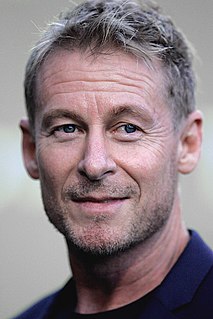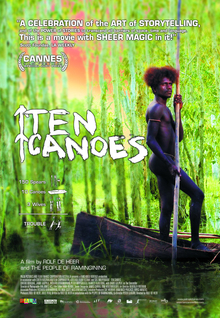
Peter Lindsay Weir, AM is an Australian film director. He was a leading figure in the Australian New Wave cinema movement (1970–1990), with films such as the mystery drama Picnic at Hanging Rock (1975), the supernatural thriller The Last Wave (1977) and the historical drama Gallipoli (1981). The climax of Weir's early career was the $6 million multi-national production The Year of Living Dangerously (1982).

The cinema of Australia had its beginnings with the 1906 production of The Story of the Kelly Gang, the earliest feature film ever made. Since then, Australian crews have produced many films, a number of which have received international recognition. Many actors and filmmakers started their careers in Australian films, many of whom have acquired international reputations, and a number of whom have found greater financial benefits in careers in larger film-producing centres, such as in the United States.

Hugo Wallace Weaving is an English actor. Born in Colonial Nigeria to English parents, he has resided in Australia for the entirety of his professional career. He is the recipient of six Australian Academy of Cinema and Television Arts Awards (AACTA) and has also been recognized as an Honorary Officer of the Order of Australia.

Nagisa Ōshima was a Japanese film director and screenwriter. One of the foremost directors within the Japanese New Wave, his films include In the Realm of the Senses (1976), a sexually explicit film set in 1930s Japan, and Merry Christmas, Mr. Lawrence (1983), about World War II prisoners of war held by the Japanese.

Richard Roxburgh is an Australian actor, writer, producer, and director. He has won acclaim for his performances on the stage in productions by the Sydney Theatre Company and others, in Australian films and television series, and in a number of Hollywood productions.

David James Stratton is an English-Australian award-winning film critic, as both a journalist and interviewer, film historian and lecturer and television personality and producer.
Kerry Michelle Armstrong is an Australian film, television and stage actress. She is one of only two actresses to win two Australian Film Institute Awards in the same year, winning Best Actress in a Leading Role for Lantana and Best Actress in a Leading Role in a Television Drama for SeaChange in 2001.

Lantana is a 2001 Australian drama film, directed by Ray Lawrence and starring Anthony LaPaglia, Kerry Armstrong, Geoffrey Rush and Barbara Hershey. It is based on the play Speaking In Tongues by Andrew Bovell, which premiered at Sydney's Griffin Theatre Company. The film won seven AACTA Awards including Best Film and Best Adapted Screenplay.

Phillip Noyce is an Australian director, producer, and screenwriter of film and television. Since 1977, he has directed over 19 feature films in various genres, including historical drama, thrillers, and action films. He has also directed the Jack Ryan adaptations Patriot Games (1992) and Clear and Present Danger (1994) and the 2014 adaptation of Lois Lowry's The Giver.
Looking for Alibrandi is a 2000 Australian film directed by Kate Woods from a script by Melina Marchetta based on her 1992 novel of the same name. The film is set in 1990s Sydney, New South Wales and features a cast of Australian actors, including Pia Miranda as Josephine Alibrandi, the film's main character; Anthony LaPaglia as her father, Michael Andretti, who left her and her mother before her birth; and Kick Gurry as Josie's love interest, Jacob Coote. The film won the Australian Film Institute Award for Best Film in 2000.

Ten Canoes is a 2006 Australian drama film directed by Rolf de Heer and Peter Djigirr and starring Crusoe Kurddal. The title of the film arose from discussions between de Heer and David Gulpilil about a photograph of ten canoeists poling across the Arafura Swamp, taken by anthropologist Donald Thomson in 1936. It is the first ever movie entirely filmed in Australian Aboriginal languages. The film is partly in colour and partly in black and white, in docudrama style largely with a narrator explaining the story. The overall format is that of a moral tale.

Jindabyne is a 2006 Australian drama film by third time feature director Ray Lawrence and starring Gabriel Byrne, Laura Linney, Deborra-Lee Furness and John Howard. Jindabyne was filmed entirely on location in and around the Australian country town of the same name: Jindabyne, New South Wales, situated next to the Snowy Mountains.

Bliss is a 1985 Australian comedy-drama film directed by Ray Lawrence, and co-written by Lawrence and Peter Carey, based on Carey's 1981 novel of the same name. It stars Barry Otto, Lynette Curran and Helen Jones.
George Feather Lawrence (1901–1981) was born in Sydney, Australia and for many years was regarded as one of the foremost painters in the impressionist style. He studied under Julian Rossi Ashton at the famous Sydney Art School in the old Queen Victoria Building; and later in London and Paris.
Ben Lawrence is an Australian photographer and director of TV commercials and short films. He is the son of Australian film maker Ray Lawrence.
Andrew Keith Plain was an Australian sound designer and supervising sound editor. Through his company, Huzzah Sound, he created the soundtracks for many Australian and international films and television series including Alex Proyas's Knowing; Phillip Noyce's Catch A Fire; Jane Campion's In The Cut; Gillian Armstrong's Death Defying Acts, Charlotte Gray and Oscar and Lucinda; Ray Lawrence's Lantana and Jindabyne; Neil Armfield's Candy; Peter Duncan's Unfinished Sky and Children of the Revolution, Sarah Watt's Look Both Ways, Richard James Allen's Thursday's Fictions; Rolf De Heer's Alexandra's Project, John Curran's Praise, and Dein Perry's Bootman.
The Inaugural Australian Academy of Cinema and Television Arts Awards, known more commonly as the AACTA Awards, presented by the Australian Academy of Cinema and Television Arts (AACTA), honoured the best Australian and foreign films of 2011 took place on two separate events, in Sydney, New South Wales: the AACTA Awards Luncheon, on 15 January 2012, at the Westin Hotel, and the AACTA Awards Ceremony, on 31 January 2012, at the Sydney Opera House. Following the establishment of the Australian Academy of Cinema and Television Arts, by the Australian Film Institute (AFI), these awards marked the inauguration of the AACTA Awards, but served as a continuum to the AFI Awards, which were presented by the AFI since 1958. The ceremony was televised on the Nine Network.
An Australian Government Film is an Australian film that has been funded by the Australian government at either a state or federal level. This type of film is distinct from an Australian independent film which has had no up-front government investment.
Al Clark is an Australian film producer. He is best known for his producer role on TheAdventures of Priscilla, Queen of the Desert and his executive producer role on the film, Chopper. Clark is also the author of three books. Time Flies is Clark's memoir and third book. It a sometime-hard-to-believe-but-no-its-all-true adventure that merges the early days of punk and New Wave with the truncated British film renaissance of the 1980s and the world of international film finance. Raymond Chandler in Hollywood provides an insight into the work of the writer of detective fiction and includes interviews with many of the Hollywood figures who were associated with Raymond Chandler and his films. Among them Clark interviewed Lauren Bacall, Alfred Hitchcock, Fred MacMurray and Robert Montgomery. His second book was Making Priscilla, also titled The Lavender Bus: How a Hit Movie Was Made and Sold, a behind the scenes tale chronicling the follies of the film making business and how The Adventures of Priscilla, Queen of the Desert became an international success.










